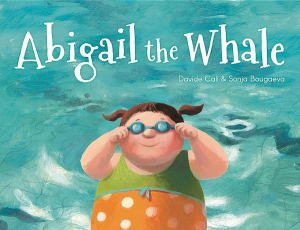Reviewed by Kassie Colón
Review Source: Independent
Book Author: Davide Cali
I’ve always been a fat girl. Growing up my chubby body experienced all the awful bullying associated with having cheechos. But if there was one thing I hated more than the vulgar names peers directed at me while I joyfully ate the food that made me happy, it was going to the pool or beach. There are tons of fat girls who can relate. We are ashamed of our bodies and hide our curves from people under pool towels and fear swimming because a shark might think our legs are the juiciest piece of meat in the ocean. And since the educational spaces we are socialized in have done little to combat body-shaming by promoting fat acceptance, we internalize lack of representation as body-hatred.
When I was told by a publishing house that they didn’t have any YA/Children’s books promoting fat acceptance, I became curious as to what literature was out there for fat kids. I decided to curate a Fat Studies Booklist for SocialJusticeBooks.org and searched for books that debunked traditional fat narratives. That’s when I came across Davide Cali and Sonja Bougaeva’s Abigail the Whale. Yep, you read that correctly. “Abigail the Whale,” a common insult given to fat girls whenever we do anything water related. I was surprised to see how much this book was praised. Reviewers called it “inspiring” and “a promotion of self-acceptance,” but I am calling it awful – DO NOT RECOMMEND.
What was supposed to destigmatize fat girls swimming as something normal, clearly missed the mark. The book’s title page places “Abigail The Whale” above her as she puts on goggles to prepare for swim class. A dehumanizing opening image that plants a negative perception of Abigail in young reader’s minds. She is nothing more than a swimming-whale versus an actual human being. Seriously, why can’t fat kids do normal things, like swimming or reading this book, without someone reminding us that our bodies are different from what society has deemed as desirable?
The illustrations don’t help. During swim class, Abigail’s diving splash is exaggerated, signaling to readers that when fat swimmers jump, they should expect an overflowing swimming pool tsunami. When Abigail comes up from the water, her classmates chant, “Abigail is a whale,” prompting the swimming instructor to tell Abigail, “We are what we think . . . so if you want to feel light, think light.” I couldn’t believe what I read. This paired with author Davide Cali’s referral of Abigail as “big” is a negative mark. Instead of telling the skinny kids their taunting was unacceptable, he placed the burden on Abigail, teaching her to deflect her fat body by pretending to be light.
Throughout the book, as Abigail encounters various obstacles, she envisions herself as water, a giant, a hedgehog, a kangaroo, a statue, a rabbit, and a shinning sun. Literally, anything but herself. This is the exact distancing and compromised political society wants us to further instill in young readers! To imagine their bodies in opposition to fatness by never fully acknowledging fat bodies as acceptable, powerful, and most certainly not whales. But the book closes with the same negative trope from page one. It shows Abigail at the diving board thinking of what she’d imagine herself as. Then, page-turn, BAM! Another exaggerated illustration of Abigail diving, exclaiming, “SUPER WHALE!” as she overflows the pool.
Hey, publishing world, do better! There are far too many out-of-date children/YA books that depict fat kids as whales, pigs, dinosaurs, and cats. Many also focus on diet culture as the main problem, but dieting was created to maintain the cisheteropatriarchy’s idealistic body-type. Fat acceptance is different from body positivity, too; we need to stop conflating the two. Publishers need to actively seek manuscripts that revert the current fatphobic narrative prevalent in our literary canon. An example is publishing books where Abigail or a protagonist isn’t a whale or animal, but a talented individual who enjoys what they do. This way, we don’t continue to feed young people with biased literature about fat people that untruthfully teaches self-acceptance.


Abigail the Whale by Davide Cali
Published by Owlkids Books Incorporated on September 13, 2016
Genres: Bullying, Girls and Women
Pages: 32
Reading Level: Grade K, Grades 1-2
ISBN: 9781771471985
Review Source: Independent
Publisher's Synopsis: Abigail dreads swimming lessons. Every time she dives into the pool, she makes a big splash, and all the girls in her class shout: "Abigail's a whale!" Abigail can see that she is larger than the other girls. She feels huge, heavy, and out of place.
Abigail's swimming teacher takes her aside and points out: we can change how we see ourselves. He offers a creative visualization technique she can use to feel bolder, more confident, and more accepting of herself. Abigail tries it out in challenging situations that week — walking home in the dark, eating her vegetables, trying to fall asleep. Illustrations in the book show her perspective morphing powerfully to match her new thought patterns.
Next time she's in swimming class, instead of feeling heavy, Abigail thinks sardine, eel, barracuda, shark! She starts to figure out how to draw on mindfulness, creative thinking, resilience, and positive self-esteem to embrace exactly who she is. This picture book supports social/emotional learning and serves as a perfect jumping-off point for topics like bullying, empathy, confidence, and creative problem solving.

Leave a Reply